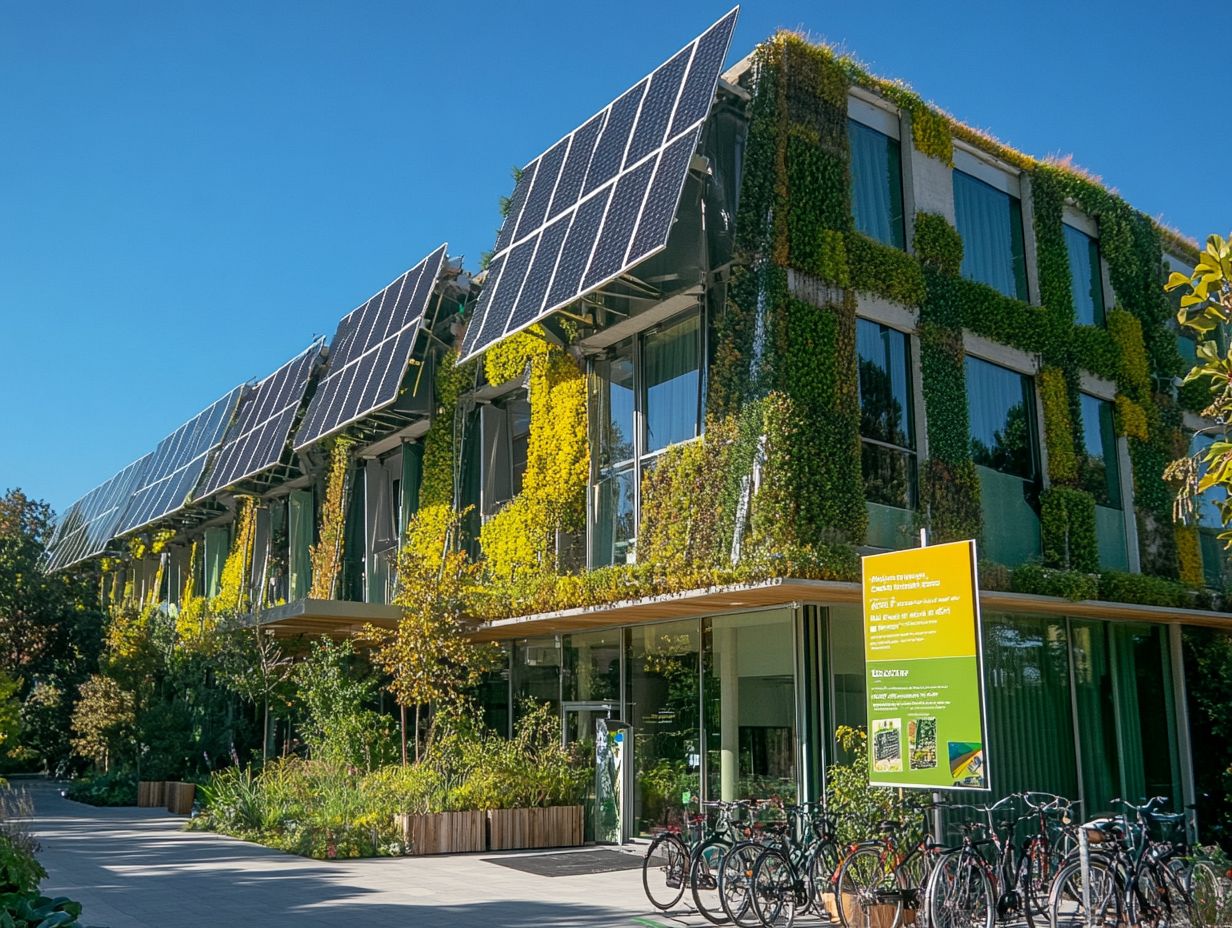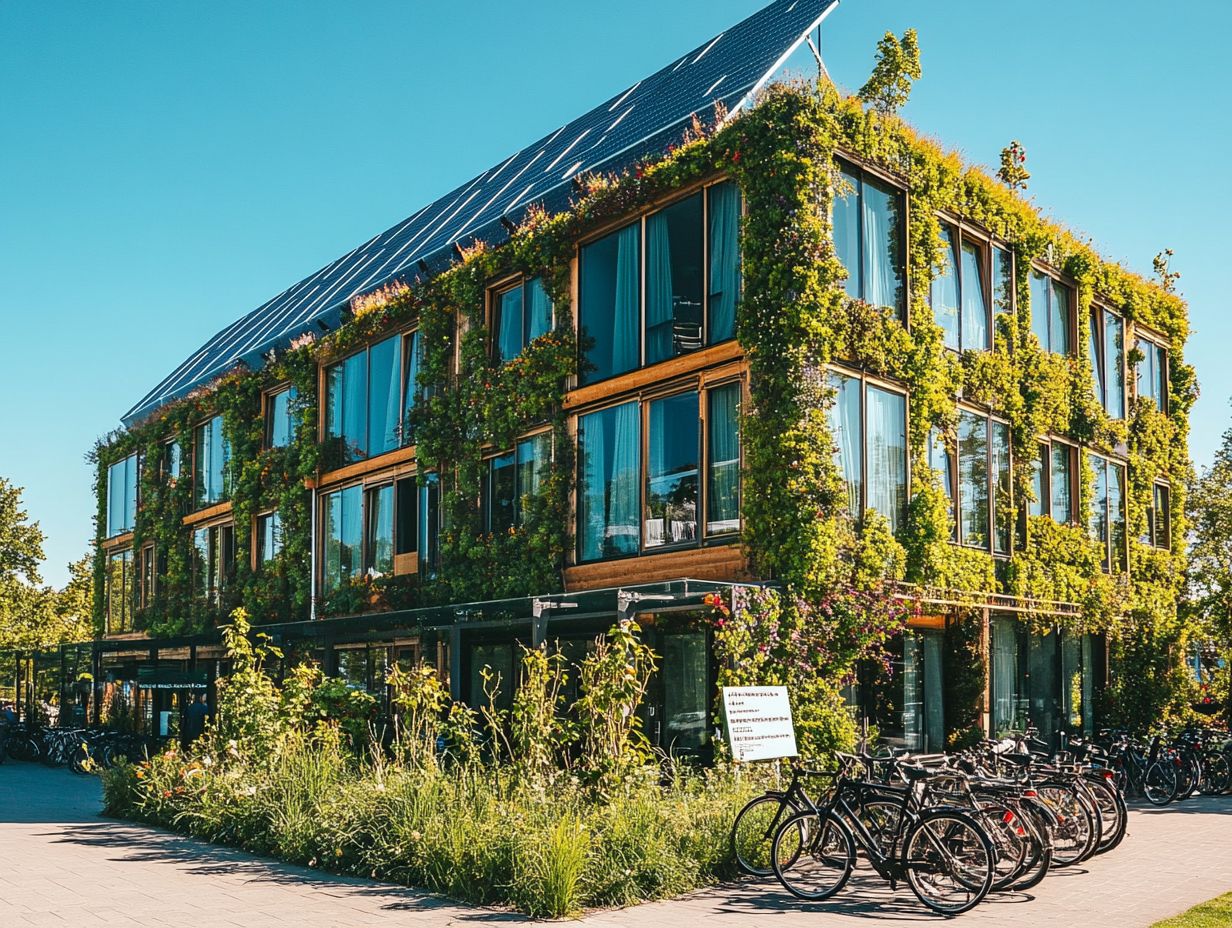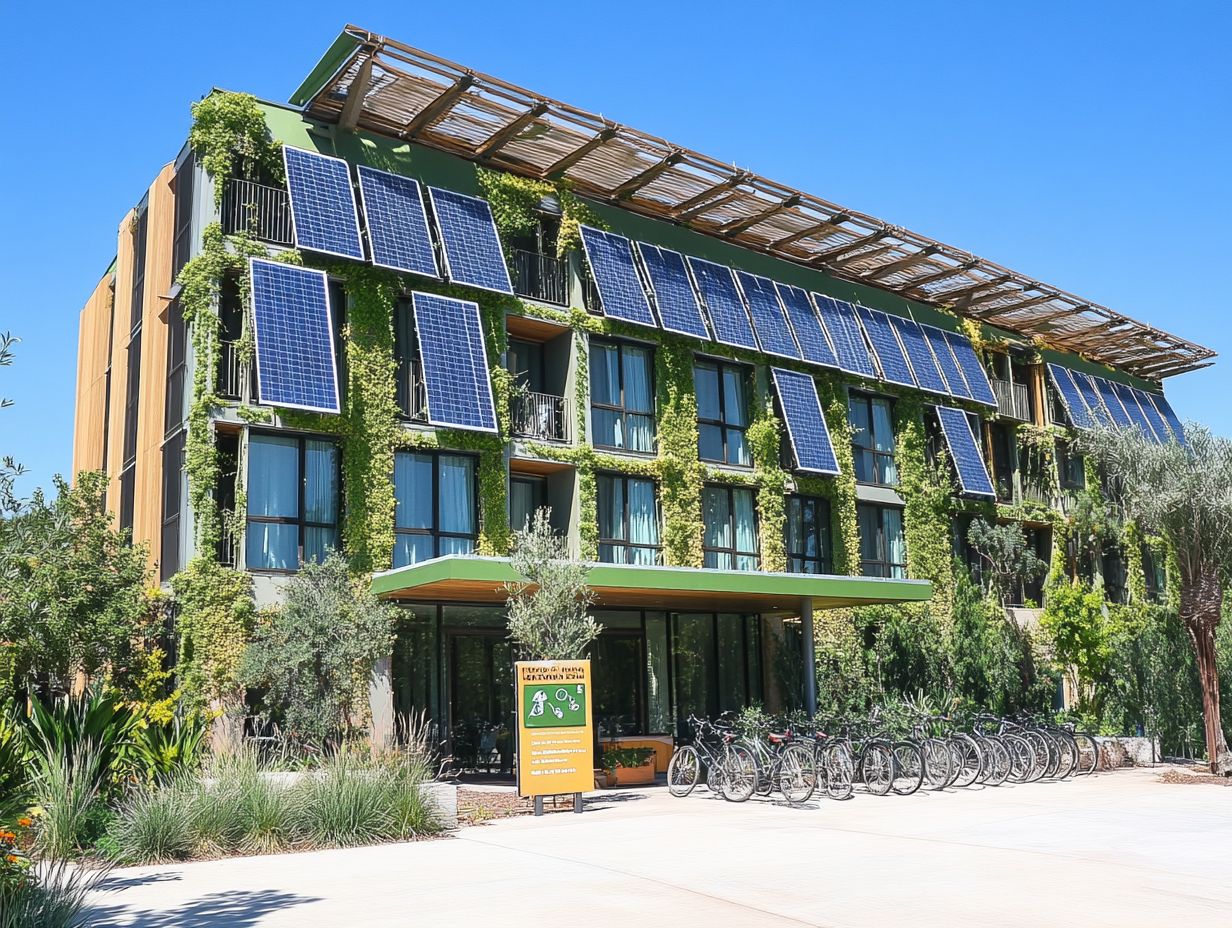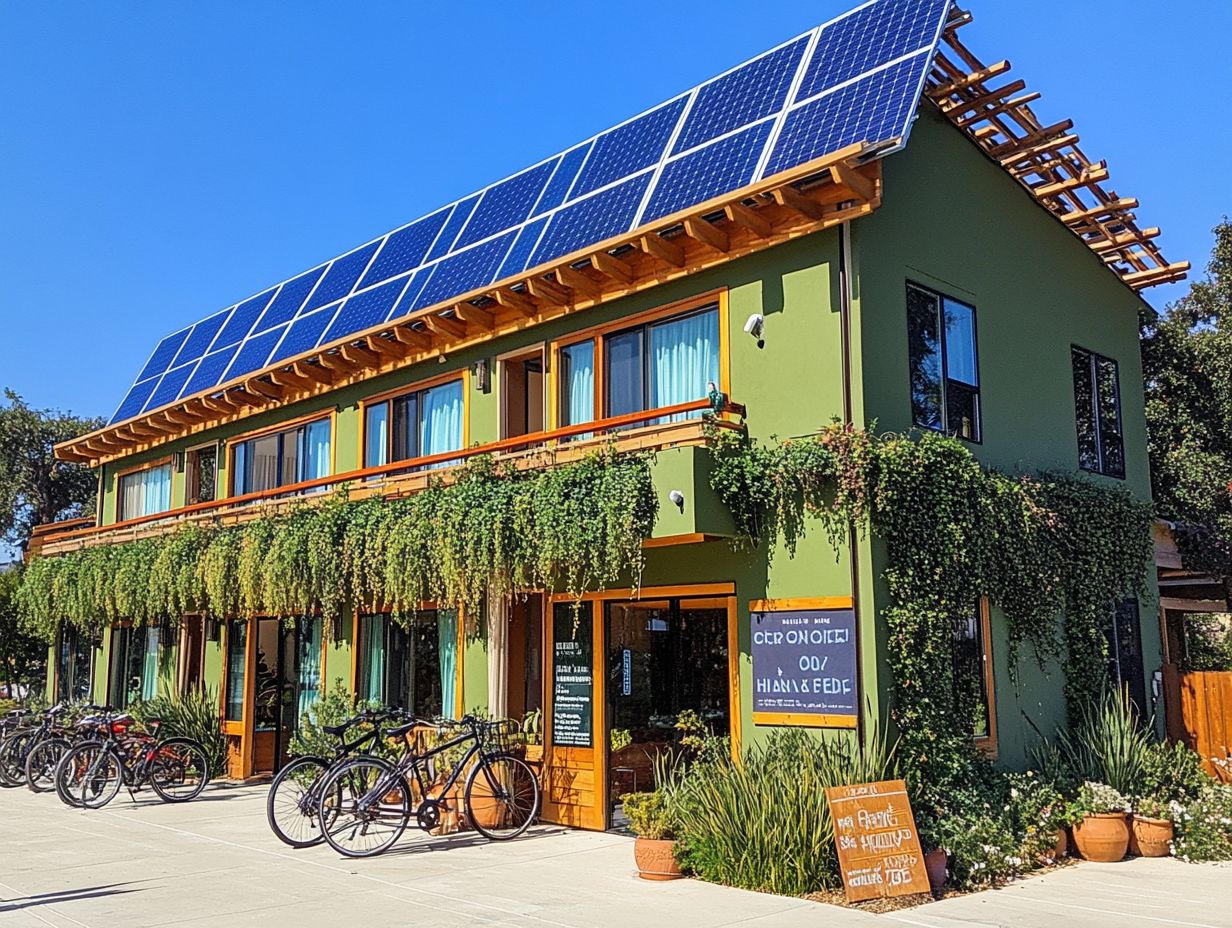How to Identify Sustainable Accommodation?
As travelers increasingly recognize the importance of their environmental impact, understanding sustainable accommodation has never been more vital. This discussion delves into the fundamental principles of sustainability within the lodging sector, showcasing its advantages for both the planet and local communities.
Consider key factors such as location, design, and efficiency, along with reputable certifications that guarantee your stay reflects eco-friendly values. Discover practical tips for finding your ideal sustainable getaway. Start your journey toward responsible travel today!
Contents
- Key Takeaways:
- Understanding Sustainable Accommodation
- Benefits of Choosing Sustainable Accommodation
- Factors to Consider when Identifying Sustainable Accommodation
- Certifications and Labels for Sustainable Accommodation
- Tips for Finding Sustainable Accommodation
- Frequently Asked Questions
- What makes an accommodation sustainable?
- How can I identify sustainable accommodation and ensure it supports local staff?
- Why is it important to stay in sustainable accommodation?
- What are some key features of sustainable accommodation?
- Is sustainable accommodation more expensive than traditional lodging?
- How can I support sustainable accommodation while traveling?
Key Takeaways:

- Choose accommodations that prioritize sustainability for a positive impact on the environment and local community.
- Consider location, building design, energy efficiency, water conservation, and waste management.
- Research recognized certifications for an ethical travel experience.
Understanding Sustainable Accommodation
Understanding sustainable accommodation means recognizing how various travel options contribute to responsible tourism and the well-being of local communities. Sustainable accommodations provide eco-friendly choices. They enhance your travel experience and support the local economy, conserve nature, and promote local tourism projects.
By choosing sustainable accommodations, you can immerse yourself in authentic experiences that align with your values while minimizing your environmental impact. This insight is crucial for anyone aiming to make informed decisions while planning their travels.
Defining Sustainability in Accommodation
Sustainability in accommodation embodies practices that minimize environmental impact while fostering social and economic benefits for local communities. This includes elements like energy consumption and waste management. Sustainable accommodations often pursue third-party certifications to validate their efforts, ensuring compliance with established sustainability criteria.
These practices range from harnessing renewable energy sources, such as solar panels and wind turbines, to implementing water conservation measures, like low-flow fixtures. Responsible waste management practices think recycling and composting are crucial in reducing landfill contributions. Many establishments also source local products and services, bolstering local economies and nurturing a sense of community.
By embracing these initiatives, accommodations not only reduce their environmental footprint but also cultivate a positive impact on the neighborhoods they occupy, ultimately crafting a more responsible travel experience for guests.
Benefits of Choosing Sustainable Accommodation
Choosing sustainable accommodation provides a wealth of benefits that go far beyond comfort; it positively influences both the environment and local communities. By selecting these options, you contribute to the local economy, support community initiatives, and minimize your environmental footprint through eco-friendly practices.
When you opt for sustainable stays, you re not just a traveler; you become an advocate for responsible tourism, making choices that foster better outcomes for the planet and its people.
Environmental and Social Impact
The environmental impact of sustainable accommodation is significant. These options prioritize the wellbeing of the planet.
They also focus on local communities. Many sustainable accommodations employ locals and source products from nearby, enhancing tourism that helps local communities while minimizing their environmental footprint.
Choosing sustainable tourism supports local artisans, farmers, and service providers. This creates an economy that values community and protects the environment.
Your choice makes a huge difference in preserving cultural heritage and promoting responsible travel practices.
The emphasis on using organic, locally sourced materials reduces transportation emissions. This deepens the connection between you and the destination, resulting in a more authentic and enriching experience for everyone involved.
Factors to Consider when Identifying Sustainable Accommodation

When you’re seeking sustainable accommodation, several key factors should guide your choices. These ensure they resonate with sustainability principles.
Important criteria to consider include:
- Energy and water efficiency
- Effective waste management practices
- Community support offered by the accommodation
By thoughtfully evaluating these elements, you can make informed decisions that genuinely reflect your commitment to sustainable travel.
Location and Building Design
Location and building design are pivotal for the sustainability of accommodations. They shape both environmental impact and community integration.
Sustainable accommodations are often deliberately positioned to minimize travel-related effects. They embrace eco-friendly building designs that lower energy consumption and bolster the local economy.
By incorporating renewable energy sources like solar panels and rainwater harvesting systems, facilities can significantly boost their energy efficiency. Choosing eco-conscious accommodations close to local attractions draws in eco-conscious travelers and cultivates a vibrant community atmosphere, inviting guests to explore nearby restaurants, art galleries, and markets.
This support for local businesses creates a beneficial cycle that invigorates the economy. Ultimately, eco-friendly hotels that emphasize sustainable practices strive to harmonize nature with urban settings. This provides you with a distinctive experience along with a commitment to environmental preservation. To enhance your travels, consider learning how to make sustainable choices in travel.
Energy and Water Efficiency
Energy and water efficiency are crucial in assessing the sustainability of accommodations. They influence both your operational costs and environmental impact.
Sustainable accommodations utilize innovative technologies and practices designed to reduce energy consumption and optimize water use. They play a significant role in effective waste management.
These establishments use smart thermostats, solar panels, and energy-efficient appliances to lower their carbon footprint. Advanced water-recycling systems and low-flow fixtures ensure that this precious resource is used wisely.
Implementing rainwater harvesting systems conserves water and reduces reliance on municipal supplies. Many accommodations are exploring geothermal heating and cooling systems, which harness the Earth’s stable temperature for efficient climate control.
By adopting these environmentally friendly practices, today’s accommodations enhance their operational sustainability and inspire a broader movement toward eco-conscious living.
Start your sustainable travel journey today!
Waste Management and Recycling
Waste management and recycling are crucial for sustainable accommodation. By choosing places that prioritize these practices, you help reduce landfill waste and support recycling efforts.
These establishments often use smart techniques like composting food scraps and choosing materials that are good for the environment. Such actions not only cut down on waste but also inspire a culture of sustainability.
By educating guests about the importance of recycling and responsible disposal, they enhance community awareness and encourage participation in environmental stewardship.
Effective waste strategies also foster local partnerships, supporting businesses that align with sustainable practices. In this interconnected landscape of eco-consciousness, sustainable accommodations serve as pillars of positive change within their communities. When considering these options, it’s important to know what to ask when booking a green hotel, illustrating that thoughtful environmental responsibility can lead to a healthier planet for future generations.
Certifications and Labels for Sustainable Accommodation
Certifications and labels for sustainable accommodations are essential markers for travelers seeking responsible tourism options. When you choose certified accommodations, you can feel proud to know they meet rigorous sustainability standards, verified through impartial third-party certification processes.
This ensures that your choice reflects a genuine commitment to eco-friendly practices and a focus on identifying sustainable travel brands that support local communities.
Recognized Standards for Sustainability

Recognized standards for sustainability in accommodations are established through various certification programs designed to promote eco-friendly hotels and sustainable practices. These standards provide a reliable framework for identifying accommodations that prioritize responsible tourism principles.
Among these initiatives, certification programs like Green Globe and EarthCheck stand out for their rigorous criteria, covering vital aspects such as energy efficiency, waste management, and water conservation. By choosing establishments with these certifications, you can explore the future of sustainable accommodations that align with a commitment to green practices, reinforcing your own values in environmental stewardship.
These recognized programs not only support sustainable operations but also foster a positive impact on local communities, promoting economic resilience alongside ecological integrity. Making informed choices in your travel accommodations, such as knowing what to look for in sustainable stays, contributes to a brighter, more sustainable future for all.
Tips for Finding Sustainable Accommodation
Navigating the landscape of sustainable accommodation can feel overwhelming. However, with the right strategies, discovering eco-friendly options that align with your needs becomes a seamless endeavor.
Begin by exploring reputable booking platforms and reading customer reviews; these invaluable insights will illuminate sustainable tourism choices and offer a glimpse into the experiences of fellow travelers.
Researching and Comparing Options
Researching and comparing sustainable accommodation options is essential for making well-informed travel decisions. Consider exploring various sustainable tourism options, such as eco lodges, homestays, and certified accommodations. Lean on customer reviews to assess their authenticity and quality.
By using online resources, you can delve into platforms dedicated to eco-friendly lodging that showcase green certifications and environmentally responsible practices. Additionally, learning how to identify sustainable travel spots can enhance your experience. Comparison websites tailored for sustainable tourism can make your search easier by filtering options by location, amenities, and sustainability ratings.
As you read through diverse customer reviews, you’ll gain valuable insights not only about the accommodations but also about the firsthand experiences of previous guests. This will shed light on important aspects like eco-friendly initiatives, community involvement, and the overall impact of your stay.
This comprehensive approach gives you the power to align your accommodation choices with your values and contribute positively to the planet.
Frequently Asked Questions
Here are some common questions about sustainable accommodations:
What makes an accommodation sustainable?
Sustainable accommodation refers to lodging facilities that are designed and operated in an environmentally responsible manner, taking into consideration the impact on the environment, local communities, and the economy.
How can I identify sustainable accommodation and ensure it supports local staff?

Look for certifications like LEED (Leadership in Energy and Environmental Design) or Green Key, which indicate that the accommodation has met certain sustainability standards. You can also check for eco-friendly practices, sustainable amenities, and involvement in local community initiatives.
Why is it important to stay in sustainable accommodation?
Staying in sustainable accommodation supports environmentally responsible practices and helps minimize negative impacts on the planet and local communities. It allows you to be a responsible traveler and contribute to sustainable tourism.
What are some key features of sustainable accommodation?
Sustainable accommodation often includes features such as energy-efficient lighting and appliances, water conservation measures, the use of renewable energy sources, waste reduction and recycling programs, and sustainable food and beverage options.
Is sustainable accommodation more expensive than traditional lodging?
Not necessarily. While some sustainable accommodations may be more expensive due to their eco-friendly features, there are also many affordable options available. Do your research and compare prices to find budget-friendly sustainable accommodations.
How can I support sustainable accommodation while traveling?
Aside from staying in sustainable accommodations, you can also choose to support local businesses, participate in eco-friendly activities, and reduce your environmental impact by practicing responsible tourism behaviors such as conserving water and energy and properly disposing of waste.
Start planning your eco-conscious trip today and be amazed by how much you can contribute to local communities!






